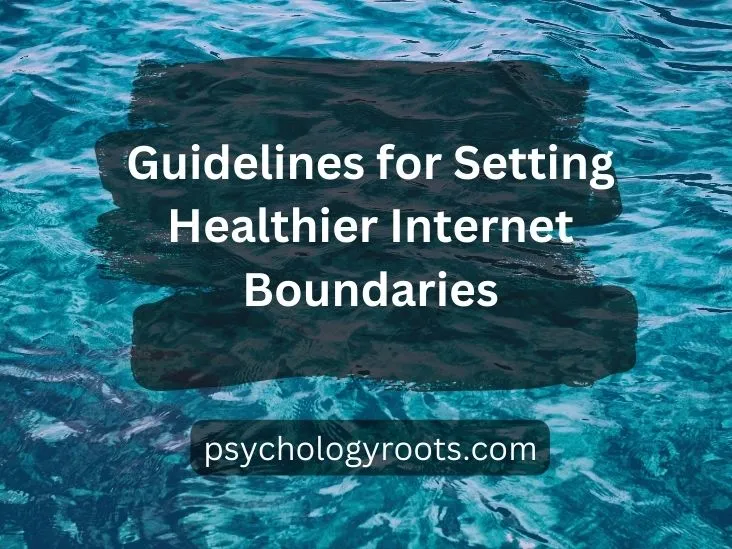Table of Contents
Guidelines for Setting Healthier Internet Boundaries
Here in this post, we are discussing “Guidelines for Setting Healthier Internet Boundaries”. You can read more about psychology-related material on our website. Keep visiting Psychology Roots.
Sixty-plus percent of the global population frequently utilises the internet to produce, distribute, and consume content. Psychologists have recently shifted their attention to studying how we use the internet to learn more about ourselves.
The following are four scientifically supported conclusions regarding making the most of the internet to your own benefit.

Avoid checking social media if you’re feeling down.
Our psychological and social demands may be quickly met by social media. But what happens if no likes or comments are received?
Social media has a long-lasting impact on teenage identity development, according to research conducted by psychologist Maria Carmen Herrera of the University of Granada and published in the Journal of Psychology. The research concluded that teenagers put a high value on social comparison and seeking social approval, and that unpleasant feelings caused by not receiving enough online validation might have long-lasting effects on adolescents.
According to Herrera, “intense usage of social media sites has been linked to increased body image issues, self-objectification, social comparison, jealousy, as well as the risk of experiencing and participating in cyberbullying.” Therefore, if you’ve been having a bad time recently, it could be wise to stand back and think about how you feel about social media.
Internet usage and loneliness may create a vicious cycle.
We are all too prone to go to the internet to satiate our desire for social connection. Compared to getting out and making friends, it is simpler. But current study reveals that this is a fruitless effort to increase social connection and, in most circumstances, just results in a self-perpetuating cycle of loneliness, as reported in Frontiers in Psychology.
Lead author of the study and a psychologist at the University of Padova in Italy, Tania Moretta, says, “It seems that any potential vicious cycle linking problematic internet use and loneliness starts with excessive internet use, which then increases loneliness because of withdrawal from face-to-face interactions.”
Poor emotional control and a reduced capacity to adapt to new situations are two characteristics of problematic internet usage. Moretta advises seeing a mental health expert if you are having trouble controlling your internet usage or find yourself yearning for the web when you can’t access it.
Accessing the internet may prevent cognitive ageing.
There is some good news about internet use. An intriguing research by Ted Schwaba of the University of Texas at Austin found a correlation between older individuals’ internet usage and greater cognitive engagement ratings. The study was published in Social Psychology and Personality Science.
According to Schwaba, “Cognitive engagement is about what you do and how you do it (exploring, learning, wondering, and asking).” “People who continue to expand their perspectives into old age tend to enjoy longer and more fulfilling lives. That’s definitely something to work on every day.
However, it is crucial to remember that older folks often have the same problems with internet usage as do young people. Schwaba places the onus on tech corporations when asked how to maximise the advantages of internet usage while reducing its negative impacts. According to Schwaba, it’s up to businesses like Google and Facebook to do a better job of creating websites that prioritise maximising human welfare above financial gain.
Another key recommendation from Schwaba’s study is to stay out of online debates with random people since they just help to propagate misinformation and disturb your peace of mind.
Conclusion
The internet is a wealth of knowledge that extends beyond the outside world. It may also reveal a lot about who we are. The internet is designed to keep you connected, learning, and interested regardless of your age.
We would gain from understanding the internet for what it really is—a medium for communication and interaction with the actual people hiding behind their screens. A shift in attitude will go a long way toward fostering a connection with the internet that is more fruitful and gratifying.
Help Us Improve This Article
Have you discovered an inaccuracy? We put out great effort to give accurate and scientifically trustworthy information to our readers. Please notify us if you discover any typographical or grammatical errors.
Make a comment. We acknowledge and appreciate your efforts.
If you have any scale or any material related to psychology kindly share it with us at psychologyroots@gmail.com. We help others on behalf of you.